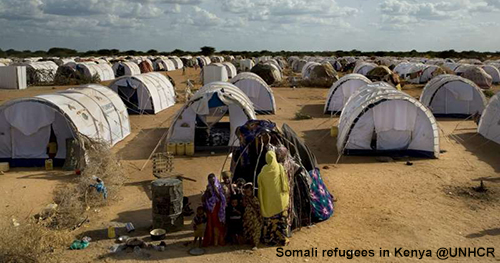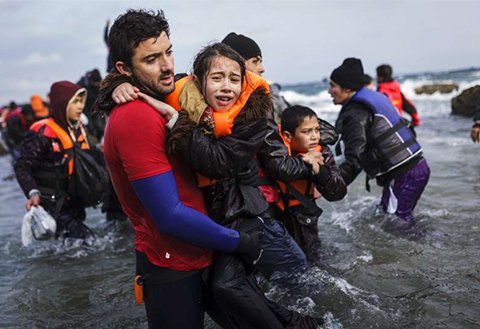The world is witnessing the highest levels of displacement on record. An unprecedented 70.8 million people around the world have been forced from home by conflict and persecution at the end of 2018. Among them are nearly 30 million refugees, over half of whom are under the age of 18. There are also millions of stateless people, who have been denied a nationality and access to basic rights such as education, healthcare, employment and freedom of movement.
An agency to help Refugees
People fleeing persecution and conflict have been granted asylum in foreign lands for thousands of years. The UN agency that helps refugees is UNHCR (also known as the UN Refugee Agency), which emerged in the wake of World War II to help Europeans displaced by that conflict.
UNHCR was established on December 14, 1950 by the UN General Assembly with a three-year mandate to complete its work and then disband. The following year, on July 28, the legal foundation of helping refugees and the basic statute guiding UNHCR's work, the United Nations Convention relating to the Status of Refugees, was adopted. So instead of ending its work after three years, UNHCR has been working ever since to help refugees.
In the 1960s, the decolonization of Africa produced the first of that continent's numerous refugee crises needing UNHCR intervention. Over the following two decades, UNHCR had to help with displacement crises in Asia and Latin America. By the end of the century there were fresh refugee problems in Africa and, turning full circle, new waves of refugees in Europe from the series of wars in the Balkans.
In a world where nearly 1 person is forcibly displaced every 2 seconds as a result of conflict or persecution, the work of UNHCR is more important than ever before.
UNHCR in the field
The UN Refugee Agency has its Headquarters in Geneva, but about 89 per cent of staff are in the field. Today, a staff of more than 9,700 people in 126 countries provides protection and assistance to nearly 59 million refugees, returnees, internally displaced and stateless people. The largest portion of UNHCR staff are based in countries in Asia and Africa, the continents that both host and generate the most refugees and internally displaced people. Many are in isolated locations where staff work in difficult - and often dangerous - conditions. Among the biggest UNHCR operations are Afghanistan, Colombia, Democratic Republic of the Congo, Mali, Pakistan, Syria, Jordan, Lebanon, Turkey and Iraq.
UNRWA
The United Nations Relief and Works Agency for Palestine Refugees in the Near East (UNRWA), was mandated by the UN General Assembly in 1949 to provide services to registered Palestine refugees in the Middle East. When the Agency began operations in 1950, it was responding to the needs of about 750,000 Palestine refugees. UNRWA is a direct service provider, delivering primary and secondary education, health care, relief and social services, camp infrastructure and improvement, microfinance, and emergency aid to Palestine refugees, now numbering 5.4 million, in the Agency’s five mandated areas of operation: the Gaza Strip, West Bank, including East Jerusalem, Jordan, Lebanon and Syria.
The World Bank has described UNRWA’s education system for 530,000 boys and girls as a “global public good”. UNRWA is an efficient and well-run Agency of the United Nations. It has carried out major reforms and savings, amounting to some $300 M since 2015.
UNRWA mandate
Definitions of refugees under the 1951 Refugee Convention and of Palestine refugees per the UN General Assembly are complementary.
For UNRWA’s mandate, ‘Palestine refugee’ relates to people whose normal place of residence was Palestine between 1 June 1946 and 15 May 1948 and who lost both home and means of livelihood as a result of the 1948 conflict. Palestine refugees and their descendants can register with UNRWA to receive services in UNRWA’s mandated areas of operation.
UNRWA has not changed and cannot change its mandate. That is the responsibility of UN Member States. These Member States, through the UN General Assembly, have tasked UNRWA to provide assistance and protection to Palestine refugees until a just and lasting political solution is found that addresses their plight.
Political solutions are difficult, which is why there remain, globally, a number of protracted refugee situations whereby successive generations continue to be recognized as refugees. The General Assembly continues to determine the necessity of UNRWA’s work in the absence of a just resolution of the question of Palestine refugees. In the absence of UNRWA, Palestine refugees would still exist.
Descendants of refugees retain refugee status
Under international law and the principle of family unity, the children of refugees and their descendants are also considered refugees until a durable solution is found. Both UNRWA and UNHCR recognize descendants as refugees on this basis, a practice that has been widely accepted by the international community, including both donors and refugee hosting countries.
Palestine refugees are not distinct from other protracted refugee situations such as those from Afghanistan or Somalia, where there are multiple generations of refugees, considered by UNHCR as refugees and supported as such. Protracted refugee situations are the result of the failure to find political solutions to their underlying political crises.
Support for refugee camps
 UN peacekeepers are often there to protect the camps in which refugees must live. When they are left without access to such basic necessities as food, water, sanitation and health care, the UN family provides it. Much of this support is provided through the United Nations humanitarian action machinery. The Inter-Agency Standing Committee (IASC), through its “cluster approach”, brings together all major humanitarian agencies, both within and outside the UN system, for coordinated action.
UN peacekeepers are often there to protect the camps in which refugees must live. When they are left without access to such basic necessities as food, water, sanitation and health care, the UN family provides it. Much of this support is provided through the United Nations humanitarian action machinery. The Inter-Agency Standing Committee (IASC), through its “cluster approach”, brings together all major humanitarian agencies, both within and outside the UN system, for coordinated action.
UNHCR is the lead agency with respect to the protection of refugees and the internally displaced. Along with the International Organization for Migration (IOM), it is the lead agency for camp coordination and management. And it shares the lead with respect to emergency shelter with the International Federation of Red Cross and Red Crescent Societies.
The Office of the UN High Commissioner for Refugees has twice been the recipient of the Nobel Peace Prize — in 1954 and 1981.
Climate change, natural disasters and displacement
In addition to persecution and conflict, in the 21st century, natural disaster (sometimes due to climate change) can also force people to seek refuge in other countries. Such disasters – floods, earthquakes, hurricanes, mudslides – are increasing in frequency and intensity. While most of the displacement caused by these events is internal, they can also cause people to cross borders. None of the existing international and regional refugee law instruments, however, specifically addresses the plight of such people.
Displacement caused by the slow-onset effects of climate change is largely internal as well. But through its acceleration of drought, desertification, the salinization of ground water and soil, and rising sea levels, climate change, too, can contribute to the displacement of people across international frontiers.
Other human-made calamities, such as severe socio-economic deprivation, can also cause people to flee across borders. While some may be escaping persecution, most leave because they lack any meaningful option to remain. The lack of food, water, education, health care and a livelihood would not ordinarily and by themselves sustain a refugee claim under the 1951 Convention. Nevertheless, some of these people may need some form of protection.
All of these circumstances - conflict, natural disasters, and climate change - pose enormous challenges for the international humanitarian community.
Events
As proclaimed by the General Assembly, World Refugee Day is observed annually on 20 June.
The UN General Assembly hosted a high-level meeting on 19 September 2016 to address large movements of refugees and migrants, with the aim of bringing countries together behind a more humane and coordinated approach.


.png)